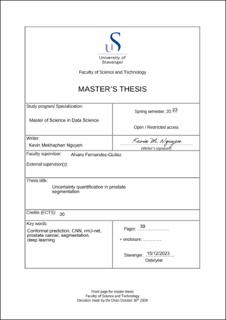| dc.description.abstract | Prostate cancer, a significant global health challenge, necessitates innovative diagnostic solutions. Despite the invaluable role of Magnetic Resonance Imaging (MRI), challenges persist in analysis due to time-intensive tasks and inter-reader variability. Accurate prostate segmentation is critical for diagnosis, influencing clinical decisions and further testing choices.
Traditionally, Convolutional Neural Networks (CNNs) have been employed for automated segmentation tasks, but the manual assessment of segmentation quality remains a crucial bottleneck. This research shifts the paradigm by exploring statistical approaches, specifically focusing on Conformal Prediction (CP), to evaluate the quality of prostate segmentation. Clinically relevant metrics, including Dice Score, relative volume difference, efficiency, and validity, are employed for quantitative assessment and comparison. The conformal classifier demonstrates robustness across diverse datasets. Nearest-Neighbor interpolation ensures image resizing uniformity, and patient-centric data splitting with Region of Interest (ROI) extraction enhances the model's focus.
The work we present is an innovative approach in prostate cancer segmentation using conformal prediction. It focuses on quantifying uncertainties in segmentation and evaluates segmentation quality through the Dice Score and RVD metrics. The study stands out for its high validity and efficiency, achieving percentages ranging from 94.24\% to 99.34\% on external datasets. This approach significantly enhances the diagnostic accuracy in prostate cancer detection via MRI analysis, showcasing the potential of integrating conformal classification in medical imaging to improve precision in clinical diagnostics.
This research advances prostate cancer diagnosis methodologies, emphasizing the novel application of conformal prediction for quantifying the segmentation obtained by other deep learning models. The findings underscore the importance of precise segmentation quality assessment, emphasizing the significance of specific metrics in evaluating the proposed statistical approach for quality control in prostate cancer diagnosis. | |
